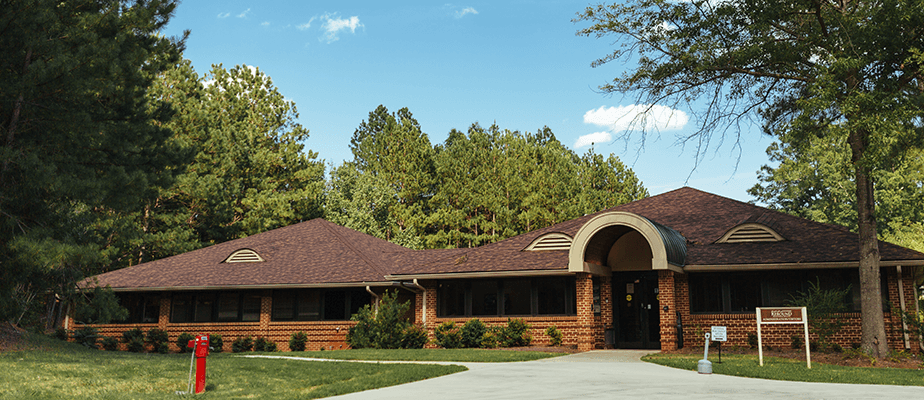Rebound Behavioral Health Hospital helps adults struggling with PTSD build a strong foundation for long-term stability. Rebound is a trusted mental health treatment center for adults in South Carolina.
More About PTSD
Learn more about PTSD and treatment at Rebound Behavioral Health in South Carolina
Posttraumatic stress disorder (PTSD) is a mental illness that some people develop after witnessing or experiencing a traumatic event. Fear is a natural reaction to danger as it tells the body when it should prepare to defend itself against danger or run away. This fight-or-flight response is a healthy emotional and physical reaction designed to protect a person from harm. However, for individuals with PTSD, this reaction is damaged or changed; these people may feel frightened or stressed even after they are no longer in danger.
As one of the leading treatment centers for those suffering from PTSD, Rebound Behavioral Health has helped countless men and women successfully learn to move past their fears and overcome their symptoms. We know that you are a unique person with personal struggles, and we are ready to use our years of experience to provide you with a treatment plan that allows you to return to a healthy level of functioning.
How to Help a Loved One
Helping a loved one get treatment for PTSD
If you have a loved one who is struggling with PTSD, it can be devastating because you are aware of how much pain they are experiencing, but don’t know what can be done to help. The symptoms your loved one is experiencing are usually so overwhelming that their sense of safety and trust have been shattered. It is important that you speak to your loved one. The sooner the PTSD is treated, the easier it will be to overcome. Here are some things to keep in mind:
Research treatment options: The level of treatment your loved one will need depends upon the severity of their PTSD symptoms and how greatly they are interfering with daily life. Those experiencing severe symptoms may need to look into seeking care at a hospital that treats PTSD to help stabilize their disorder and provide them with tools they can use. Other individuals may only need to meet with a therapist in outpatient therapy to gain additional guidance and support. Take the time to research different treatment options for your loved one, and together you can decide which treatment center best suits their needs.
Truly listen: Men and women who have gone through a traumatic experience often feel they are no longer safe in the world and may be on edge. They may have a great deal of pain about the specific event. One of the best things you can do is to simply be there for them. Genuinely listen to what they are saying, making sure to not be judgmental. Remind them how much they mean to you and that you will always be there for them. Additionally, let them know that while things may seem difficult right now, with proper help things will get better.
Support yourself: If you don’t take the time to take care of yourself, you are not going to be of much use to anyone. Find a therapist or a good friend with whom you can speak to openly and honestly about your loved one’s PTSD. It may be helpful to join a community support group to allow yourself the time to process your emotions and connect with others going through similar issues.
Why Consider Treatment
Why consider inpatient treatment for PTSD at Rebound Behavioral Health in South Carolina
If PTSD is left untreated, your symptoms may get worse. Symptoms of PTSD can come about suddenly, gradually, or come and go. While symptoms sometimes appear out of the blue, they can also be triggered by something that reminds you of the event. Constantly re-experiencing the traumatic event, avoiding things that remind you of the event, and living with increased anxiety can cause you to remain trapped with constant feelings of danger and painful memories.
Entering an inpatient treatment center that has a reputation for effectively treating those with PTSD is one of the best decisions you can make for your wellbeing. Inpatient treatment centers allow you to work through the emotions and fears you have about the traumatic event. Not only will you be in a safe environment, but compassionate staff will be there if you ever need to talk. Through different therapeutic techniques, such as individual therapy, group therapy, family sessions, and medication management, you will learn the skills that will help guide you into a brighter future.
Our Rehab Philosophy
Rebound Behavioral Health’s rehab philosophy
As the leading PTSD treatment hospital in South Carolina, our main priority is to ensure the safety of our patients while providing the most up-to-date, empirically validated treatment approaches. Our compassionate atmosphere is the perfect place for men and women struggling with PTSD to get away from the stressors of daily life and focus their energy on recovering. We firmly believe that each patient should play an active role in their recovery and build upon the strengths they already have to create a bright future. Our multidisciplinary team of doctors, nurses, therapists, psychologists, psychiatrists, and support staff will work alongside you throughout your entire journey, ensuring your treatment goals are being met. Rebound strongly believes that treatment for PTSD should never be a one-size-fits-all approach, which is why we create personalized treatment plans based upon individual needs. As the leading PTSD treatment center in South Carolina, we’re ready to help you unlock the strength within you so that you can lead the life you’ve always wanted.
Treatment Methods
Types of PTSD treatment offered at Rebound Behavioral Health
Within 72 hours of arriving at our PTSD hospital, you will be seen by a psychiatrist who, along with your treatment team, will complete a full psychological and medical evaluation to determine the most appropriate level of care for your needs. Since patient involvement is very important to the recovery process, you will be included in all aspects of the treatment planning process. Through the evaluations we will be able to determine any medical concerns or co-occurring mental disorders. We will use the results of these assessments and work with you to create a personalized treatment plan for all of your needs. Some of the different therapeutic techniques we use include:
Individual therapy is a very effective therapeutic method for people struggling with PTSD. Working closely with a therapist will help you face some of the painful emotions surrounding the traumatic event and help you to move past them. One technique called cognitive-behavioral therapy we employ at our treatment center allows us to illustrate the ways in which negative thought patterns affect your behaviors and can help you to see the world in a different way.
Group therapy can be valuable for people with PTSD as it allows you to interact socially with others in a safe and supported environment. Group sessions are held multiple times a day and will help you learn better social skills, develop more appropriate coping skills, obtain medication education, and process the emotions surrounding your symptoms of PTSD.
Family therapy is used to make sure all family members and loved ones are included throughout the treatment process. We will use family sessions to let you and your loved ones process emotions surrounding PTSD and work through any tension that may exist. On Sundays, we hold family education groups at our treatment center, which will teach your loved ones about PTSD and how they can be supportive during recovery.
Rebound Behavioral Health Hospital offers a variety of experiential therapies to complement our traditional therapeutic techniques. These include:
- Massage therapy
- Exercise therapy
- Activity therapy
- Relaxation therapy
- Music therapy
- Pet therapy
- Spiritual counseling
- A.A. and N.A. groups
Discharge & Continuing Care
Maintaining your mental health while suffering from PTSD
As your time for discharge draws close, you’ll meet with a discharge planner and your treatment team to determine the next best steps in your care. Many people opt to step down from our inpatient services into our outpatient services. This will allow you to slowly reintegrate back into your community while focusing on your recovery during the day. Other people may have made enough progress at our treatment center to be ready to return home with referrals to traditional outpatient therapy and community resources in your area.


















